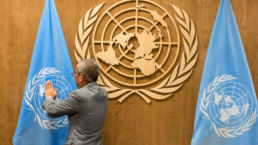The five permanent members of the Security Council — notably the U.S. and Russia — use their veto power to keep wars going.
by Jon Schwarz, The Intercept
On Wednesday, the United States was the only country to vote “no” on a proposed U.N. Security Council resolution authored by Brazil that called for “humanitarian pauses” in Israel’s bombing of Gaza. Twelve countries voted for the resolution, including several surprising ones, such as France and the United Arab Emirates. Two more, Russia and the U.K., abstained. But according to the Security Council’s rules, America’s sole “no” vote meant that the resolution failed.
Human Rights Watch criticized America’s actions, saying, “Once again the U.S. cynically used their veto to prevent the U.N. Security Council from acting on Israel and Palestine at a time of unprecedented carnage.”

The Security Council has 15 countries. Ten are rotating members, elected by the U.N. General Assembly and serving on the council for a period of two years. Five are permanent members: the U.S., Russia, China, France, and the U.K. If any of the permanent members vetoes a resolution, it will not pass, no matter how many votes are in favor. This means that any of the permanent members can veto any action by the Security Council.
Recent Posts
‘Unconstitutional. Unethical. Authoritarian.’ ICE Bars Millions Of Immigrants From Bond Hearings
July 18, 2025
Take Action Now One watchdog said the new policy “seems like a blatant attempt to stop them from exercising their right to due process.”……
Americans Are Not Nearly Alarmed Enough About Climate Change
July 18, 2025
Take Action Now Americans still don’t comprehend how imminent, dangerous, and far-reaching the threat is—and journalists are partly to blame.By…
The IRS Is Building A Vast System To Share Millions Of Taxpayers’ Data With ICE
July 17, 2025
Take Action Now ProPublica has obtained the blueprint for the Trump administration’s unprecedented plan to turn over IRS records to Homeland Security…
Israel’s Sudden Assault On Syria Is Unchecked Aggression
July 17, 2025
Take Action Now Jerusalem is bombing Damascus and threatening al-Sharaa’s rule, while Washington was hoping to help the nascent government on…




